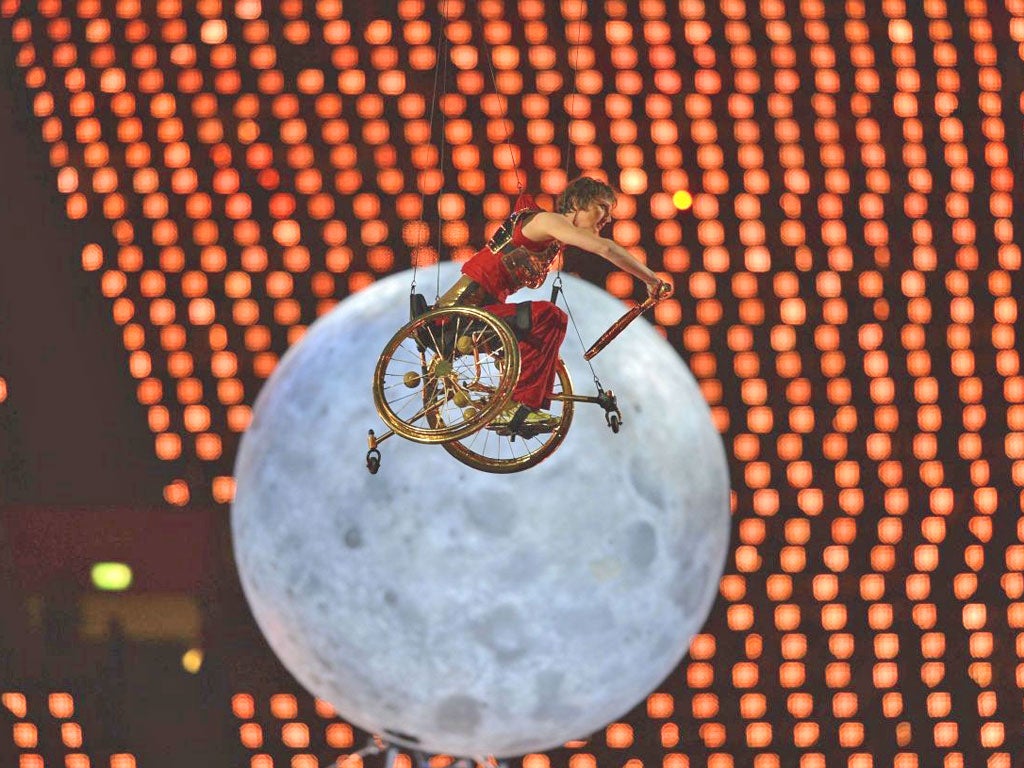Francesca Martinez: Empty words don't fund a full life for disabled people
Rhetoric about the Paralympics sounds hollow when the Government is hellbent on cutting benefits and demonising those who need them

When David Cameron made his comments at the opening ceremony of the Paralympics, I admit I felt a bit sick. His talk about the "inspirational" athletes while the Government carefully erodes the welfare system that helped many of the same athletes to achieve their dreams was pure hypocrisy. Nobody is more pleased than I am at the impact the Paralympics appear to be having. Eyes are being opened, attitudes hopefully shifted and great sport enjoyed. For once, diversity is fully visible in the media, and this is fantastic as it has the power to help to normalise difference. Disability is normal and the more we can accept it as a natural part of life, the more we can move beyond divisive labels and realise that we are all one group, sharing one planet.
The Paralympics provide the perfect opportunity for the Government to praise the human qualities of the Paralympians. But it is undeniable that government targeting of disabled people in the cuts, together with much of the right-wing press's customary (but not at the moment, you understand) portrayal of disabled people as benefit cheats and drains on society, are proving a deadly cocktail. Disability hate crime is at record levels, with up to 100,000 estimated incidents per year. People with serious conditions such as cancer or heart disease, or who require morphine every day, are being told that they are "fit to work". Disabled and sick people are being forced to endure lengthy appeals to claw back benefits that go towards essential costs. Suicides and deaths are increasing because crucial help is being withdrawn.
We are constantly being told that cuts need to be made so that the money goes to those who really need it. This is not welfare reform. It's welfare cuts. The Government wants to cut Disability Living Allowance (which has a fraud rate of 0.5 per cent) by 20 per cent. Half a million genuine claimants are to lose their benefits. A lengthy medical assessment is required to qualify for this benefit although it is already rigorously tested, which explains the low fraud rate. The word "benefit" implies getting something extra, but it exists to cover costs that non-disabled people don't have. As a taxpayer, I am happy to help pay those vital costs rather than funding illegal wars or weapons developed to kill or maim people in ever more horrific ways.
A phrase routinely trotted out is that we have to end this "something for nothing" culture. But benefits are something for something. That small minority who make fraudulent claims should be targeted, but not the majority who receive this help to cover the extra challenges they face. Given that David Cameron and his wife are set to inherit more than £20m between them, his recent criticism of the "culture of entitlement" is laughable. In fact, this Cabinet is one of the wealthiest in memory, with 80 per cent of its ministers already millionaires or multimillionaires. By contrast, one in three disabled people is already in poverty; more will no doubt follow, with the cuts. That leaders who know little of financial hardship can implement massive cuts that will devastate many, but from the effects of which they are insulated, is morally dubious.
The Government has done little to correct wildly inaccurate benefit fraud figures printed in sections of the press, figures that have contributed to a climate of hate towards those in need. Politicians such as Iain Duncan Smith have backed tabloid campaigns to dob in "scroungers". These negative portrayals demonise disabled people and have coincided with a rise in violence and abuse; sickening stories of torture and murder are on the increase. The coalition's silence on the media's scapegoating of disabled people speaks volumes.
"The Employment minister, Chris Grayling, recently talked about the need for "tough love" to get people back to work and off the Employment and Support Allowance (fraud rate 0.3 per cent). This minister claimed more than £10,000 in parliamentary expenses to renovate a flat. Has he the moral authority to speak about "scroungers"?”
Where's the tough love for the banks and the lax regulators who caused this recession, or the corporations that evade and avoid more than £100bn in taxes annually (a figure that dwarfs the £12bn in DLA and £12.5bn in ESA payments)?
In 2010, City bonuses totalled £14bn. This sector is still being protected and rewarded despite its central role in the financial crisis. The powerful clique that runs the Government and its City friends are happy to keep the profits to themselves, while sharing the deficit with us all. There is nothing wrong with using public money to fund healthcare, transport, education and the welfare state. A civilised society does its best to look after those who need it most, and is proud to do so.
This Government's ruthless ideology must be challenged. Its interests lie in keeping Britain one of the most unequal societies in the world, in keeping power and wealth in the hands of the few, in portraying those in need as a drain on resources, in protecting the rich from taxation and regulation, and in making the public believe otherwise. Disabled or not, we must join together on our streets, in our communities and at the polling station to fight for a fairer society.
Comedian Francesca Martinez's 'What The **** Is Normal?' tour continues until 20 April 2013
Join our commenting forum
Join thought-provoking conversations, follow other Independent readers and see their replies
Comments